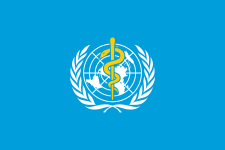 Patricia Curtin, School of Journalism and Communication, University of Oregon, and T. Kenn Gaither, School of Communications, Elon University, wrote a case study titled “Contested Notions of Issue Identity in International Public Relations: A Case Study.”
Patricia Curtin, School of Journalism and Communication, University of Oregon, and T. Kenn Gaither, School of Communications, Elon University, wrote a case study titled “Contested Notions of Issue Identity in International Public Relations: A Case Study.”Below is my summary of the case study:
The smallpox epidemic during the Cold War was taken advantage by the World Health Organization, or the WHO. It created a campaign persuading developing countries to spend money for vaccinations immediately to then save billions of dollars later. This doesn’t sound completely wrong, but notice the fact that the WHO is using one campaign for all countries affected by smallpox.
What the WHO did was create an eradication campaign that showed the benefits of committing through an analysis and presentation of cost savings. They also took advantage of the political powers that were in need of support.
After the Cold War, the WHO had the support of the Soviet Union to take ownership of a worldwide health cause that would give them influence in developing countries. The United States came on board to help when public health advisers convinced President Johnson to use the issue to promote the U.S. efforts of supporting developing nations.
The WHO also used numbers to take advantage. They started releasing numbers in the Weekly Epidemiological Record that would state which countries had eradicated smallpox, such as Western Africa and Afghanistan. When the countries that felt as if they were, “more developed,” saw these numbers, they were humiliated.
The campaign turned into a way of showing the flaws in countries and every government was fighting to not let these flaws be seen. Some government officials would not report smallpox cases to avoid shame. But with the number of cases decreasing around the world, the policy turned from a way of hiding flaws to a way of promoting the government’s ability to provide social services to their citizens.
This campaign is a focus on neocolonialism and used political, economical, and cultural pressures to control other countries. The WHO disregarded the fact that each culture is different and used force to make the government obey. It disrespected the rights of each person and used shame to take what it wanted.
Making a campaign with the entire world as your target audience is impossible. Every place you go to is a new audience, new culture and has new norms. The WHO did not look at it that way, which resulted in a lot of distrust down the road.
For example, after the September 11 attacks, the WHO had turned the “identity of smallpox from U.S. moral leadership to one of international terrorism and a weapon against U.S. aggression.”
Also, as smallpox is on the verge of coming back in some countries, the WHO seems to be on the verge of eradicating polio. But because of the outcome from the previous campaign, some are skeptical and resistant to follow through in fear of an alternative motivation.
The smallpox campaign turned more people away and disregarded the most beautiful thing this world has to offer: Culture.
No comments:
Post a Comment